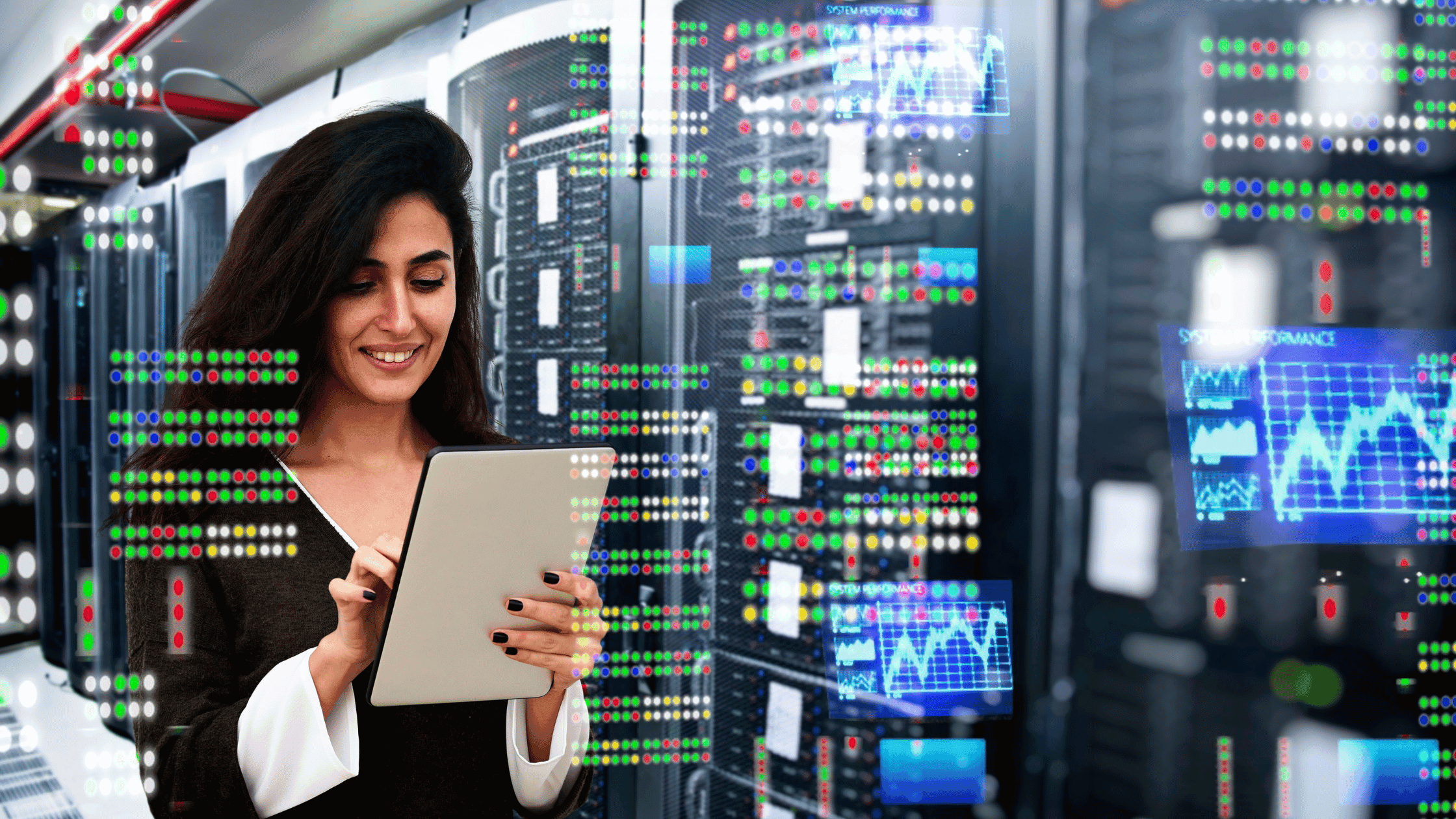How Digital Technology Examples are Transforming Industries
By 2025, advances in various digital technology examples promise to enhance efficiency in sectors like finance, healthcare, and retail.
DAte
Nov 10, 2024
Category
How to?
Reading Time
5 min
In 2025, digital technology examples are revolutionizing industries with unparalleled speed and scope. Imagine a world where accessing your bank account is as simple as speaking to a digital assistant powered by artificial intelligence, eliminating the need for physical branch visits, and providing instant financial insights at your fingertips.
Yes, it has.
Organizations embracing this digital shift are positioning themselves at the forefront of innovation, ready to harness the benefits and possibilities of transformative technology. The future indeed favors the bold.
Key Digital Technology Examples in 2025
Innovation in digital technology continues to redefine industries, with healthcare, finance, and retail leading as outstanding examples of transformation, shaping a revolutionary landscape through strategic digital integration, anchored by efforts to establish a clear digital tech definition.
Blockchain technology stands at the forefront of secure transactions, leveraging cryptographic techniques.
Automation and AI drive efficiencies in logistics and supply chains, anticipating demands and optimizing routes.
Virtual Reality (VR) and Augmented Reality (AR) are enhancing user experiences in gaming, education, and beyond.
Cloud computing offers businesses scalable solutions, supporting vast data storage and analytics capabilities while improving connectivity, accessibility, and reducing costs, thereby fostering collaborative efforts across global teams.
Indeed, the era is ripe with potential that’s poised to revolutionize sectors. Seamless integration promises more efficient strategies with resilient and innovative outcomes.
Transforming Healthcare with Telehealth
Telehealth is revolutionizing healthcare by offering remote consultations, bridging distances, and making access to medical care more inclusive and efficient.
In 2025, telehealth's reach extends far beyond urban centers. It connects practitioners to patients in rural locales, providing vital services that were once challenging to access. This digital bridge ensures that geographical barriers no longer dictate the quality of healthcare received.
Technological advancements have made telehealth more interactive and engaging. High-definition video and seamless communication tools enable accurate diagnostics and treatment planning, creating a virtual clinic environment that closely mirrors in-person visits. This encourages a more dynamic patient-doctor relationship, fostering trust and collaboration.
Healthcare providers are now increasingly integrating AI-driven analytics into telehealth services. This integration offers personalized health solutions, predictive healthcare management, and a proactive approach to patient care. Such precision minimizes healthcare disruptions and improves outcomes for patients across diverse demographics.
As telehealth technology continues to evolve, the potential for improved healthcare delivery grows. Its transformative power paves the way for a healthcare system that is responsive, inclusive, and focused on quality care.
Fintech Innovations in Financial Services
The financial services industry is undergoing a revolutionary change through fintech innovations that disrupt traditional banking paradigms, showcasing what are some examples of digital technology in action. These groundbreaking digital technology examples, driven by innovative software, have established fintech as a formidable force in transforming financial services.
Since fintech’s inception, companies have consistently leveraged blockchain, artificial intelligence (AI), and data analytics to refine and enhance service delivery. These tools enable processes that are more efficient, secure, and user-friendly than their traditional counterparts, significantly reshaping industry standards.
Refined financial ecosystems now capitalize on AI-driven algorithms to provide personalized financial advice and product recommendations. By leveraging consumer data, fintech allows for highly tailored financial services that meet the unique needs of each user, offering options previously unavailable through conventional banking systems.
Companies such as Revolut and Square pioneer digital-first experiences, providing real-time analytics and fostering democratized access to complex financial products. This shift highlights the growing demand for digital convenience and transparency, urging traditional banks to innovate assertively or face the risk of obsolescence.
In embracing these innovations, the future of financial services becomes increasingly dynamic and customer-centric. The scope for further transformation fueled by fintech is vast and invigorating.
Revolutionizing Retail with eCommerce
eCommerce has transformed retail into a digital powerhouse.
This evolution offers greater convenience and choice for shoppers. The once-clear lines between physical and digital shopping experiences have blurred, thanks in no small part to the rise of eCommerce giants like Amazon. Consequently, companies are now at the forefront of innovation as they navigate new strategies to retain consumer loyalty.
The speed of technological advancement remains incredibly rapid.
In today's evolving marketplace – one that boasts ease and accessibility beyond past imaginings for countless consumers worldwide – the growing importance of integrating omnichannel solutions has become undeniable.
Retailers embracing eCommerce demonstrate unprecedented adaptability, leveraging data-driven insights to craft engaging customer experiences, anticipating needs ahead of time, and positioning themselves strategically. With continuous evolution and the promise of technological advancements, this burgeoning digital landscape heralds boundless opportunities for redefining the future of retail.
Smart Manufacturing Practices
Smart manufacturing practices stand at the forefront of transforming the landscape of industrial operations and efficiency worldwide.
By harnessing the power of the Internet of Things (IoT), robotics, and artificial intelligence (AI), factories are evolving into intelligent ecosystems that optimize performance and efficiency. These technologies enable real-time monitoring, predictive maintenance, and adaptive production processes that enhance productivity and reduce operational downtime.
The advent of smart manufacturing has democratized access to innovative solutions, empowering both large corporations and small businesses to implement advanced technologies. This approach allows manufacturers to make data-driven decisions, minimizing waste while maximizing quality and throughput.
Embracing smart manufacturing practices ensures not only the resilience of supply chains but also positions industries to compete on a global scale. This transformation represents a fusion of technology and industry expertise that is reshaping the future of manufacturing, as industries strive to define digital tech definition within their innovative approaches.
Smart manufacturing holds the key to building industries that are agile, efficient, and ready to meet future challenges head-on, with a clear understanding of digital technical technology definition to guide innovation.
Advancements in Precision Farming
Precision farming utilizes cutting-edge digital technology examples like IoT, big data analytics, and drones to revolutionize agriculture. By examining what are some examples of digital technology, such as these, advancements empower farmers to optimize their operations.
Drones provide real-time monitoring and in-depth analysis of crop health and soil conditions.
The data gathered from these devices enables farmers to make informed decisions about planting, irrigation, and fertilization, leading to increased crop yields and sustainability. By observing weather patterns and soil moisture levels, they can precisely control the input of resources.
Such progressive technology integration in agriculture not only maximizes the efficiency of farm operations but also significantly reduces environmental impacts by ensuring minimal waste of resources. In doing so, it promotes sustainability and food security in a rapidly growing global population. This leap forward in technology positions agriculture as a frontier for transformative innovation, reflecting the potential for further advancements.
Impact of IoT on Industries
The Internet of Things (IoT) has become a pivotal force, steering the transformation of numerous industries and altering operational landscapes.
In manufacturing, IoT and software employ interconnected devices in a seamless network, allowing real-time monitoring, predictive maintenance, and data-driven decision-making to enhance production efficiency, connectivity, and safety. This innovation optimizes resource utilization and lowers operating costs, driving industries towards more sustainable practices. Additionally, IoT ensures the ability to swiftly respond to any disruptions, ensuring minimal impact on operations.
Remarkably, retail has witnessed a paradigm shift through IoT implementation. By integrating smart shelves and RFID tags, retailers can track inventory in real-time, preventing stockouts and overstocks while enhancing the shopping experience for consumers.
Therefore, the widespread adoption of IoT across industries is monumental, fundamentally shifting traditional business models towards proactive, data-centric frameworks. As organizations harness IoT, they unlock new opportunities for innovation and operational excellence, positioning themselves strategically in the competitive global market. The ongoing evolution of IoT technologies signifies the dawn of a smarter, more connected industrial era.
Artificial Intelligence Driving Innovation
Artificial Intelligence (AI) is at the heart of transformational change, revolutionizing multiple industries and carving new paths for excellence and growth. The versatility of AI allows its application across virtually every sector.
AI optimizes processes by creating efficiencies similar to IoT technologies. From predicting consumer behavior to automating routine tasks, AI’s capabilities are boundless and continually expanding.
In healthcare, AI-enhanced diagnostics are significantly improving patient outcomes. Smarter algorithms interpret medical data with unprecedented accuracy, leading to timely interventions and customized treatment plans driven by real-time insights. AI's adoption is redefining modern healthcare protocols.
The synergy between AI and digital technology exemplifies the future of global industries, setting a precedent for intelligent innovation that pushes past conventional limits. As businesses integrate AI into their frameworks, they gain a competitive edge by leveraging its predictive power for strategic decisions, signifying an era of unparalleled advancement. This powerful alliance, often referred to as "the Fourth Industrial Revolution," is poised to transform our world.
Boosting Efficiency with Blockchain
Blockchain technology is revolutionizing efficiency across industries.
Originally known for its role in cryptocurrency, blockchain offers transparent and immutable records of transactions, which prove essential for sectors like finance and supply chain management. These industries rely on the secure exchange of data, streamlined through blockchain's decentralized ledger system, ensuring accountability and efficiency in modern networks.
The capability of blockchain to eliminate intermediaries is remarkable.
With blockchain, enterprises can reimagine asset tracking, from verifying the origin of diamonds to streamlining cross-border payments with real-time settlements, reshaping business models and fostering trust-based ecosystems.
By 2025, blockchain's decentralized architecture is anticipated to drive exponential improvements in processes requiring verification and monitoring, providing a robust framework even as traditional systems face the challenges of an increasingly digital environment. Organizations that harness blockchain technology can expect significant gains in operational efficiency, positioning themselves at the forefront of industry transformation.
Enhancing Customer Experiences
In 2025, digital technical advancements, encompassing the digital technology meaning and the digital tech definition, are dramatically enhancing customer experiences across diverse industries. How are businesses achieving this remarkable transformation?
In healthcare, telehealth provides patients with the convenience of consulting their doctors and specialists without traveling, enhancing accessibility and satisfaction. Streamlined processes translate into quicker appointments and better patient outcomes.
In the finance sector, personalized AI-driven financial advisories ensure that customers receive tailored services, boosting loyalty and reducing churn. Fintech innovations have unleashed a new era of customer-centric financial ecosystems.
Retail customers experience unparalleled convenience through detailed product recommendations and seamless payment solutions. AI-powered virtual assistants further personalize shopping experiences, predicting preferences and offering efficient customer service.
The continued adoption of digital technologies promises to redefine customer interactions, setting new standards and unlocking transformative potential.
Creating New Business Models
Innovative digital technologies, encapsulated in the define digital technology framework, are creating new business models.
Industries across the globe are harnessing the power of digital innovation. This shift enables companies to design unique approaches to differentiate themselves, adapt to an ever-evolving market landscape, and gain competitive advantages. Importantly, organizations that successfully tap into these emerging capabilities find themselves at the forefront of delivering unprecedented customer value.
This transformation is leveling the playing field.
Companies can now explore uncharted territories - in both their product offerings and how they connect with consumers - as they leverage cutting-edge digital-first strategies and data-driven insights.
These novel business models allow organizations to dynamically reconfigure their operations, overcoming traditional barriers and accelerating growth. Through this evolution, businesses are keenly focused on harnessing the possibilities of 2023 while blazing paths for future innovation. Embracing digital evolution proves not only advantageous but essential for fostering sustainable progress in today’s high-tech marketplace.
Challenges in Adopting Digital Technologies
However, this digital transformation journey is not without its hurdles. Organizations face multiple challenges as they strive to integrate digital technologies into their existing systems and processes.
In the pursuit of modernization, companies often grapple with the high costs associated with technological upgrades. For instance, interwoven legacy systems can be both costly and time-consuming to replace or integrate with new digital solutions.
Moreover, there is a scarcity of skilled professionals who are adept at managing and implementing these advanced technologies. This skills gap can stall the transition to digital technologies, delaying potential benefits.
Furthermore, there is an inherent resistance to change within organizations, where established practices and mindsets can impede the adoption process. Encouraging agility and fostering an innovative culture are crucial to overcoming this inertia.
Ultimately, addressing these challenges is pivotal to unlocking the full potential of digital technologies for business growth.
Future Trends in Digital Transformation
Remarkable strides await the digital landscape's continual evolution, prompting us to consider what are some examples of digital technology driving this change.
Organizations will increasingly adopt artificial intelligence and machine learning to automate operations. These technologies will help analyze large amounts of data, making processes more efficient and allowing companies to offer hyper-personalized experiences to their customers. Consequently, businesses will also find exciting new applications for developing autonomous systems.
The Internet of Things will see exponential growth.
This expansion will connect various devices across industries—be it smart home systems, industrial sensors, or health monitoring wearables—enhancing connectivity and data-driven decision-making. Such interconnected systems will create a seamless flow of information and elevate productivity.
Moreover, immersive technologies like virtual and augmented reality will be at the forefront of the transformation. They will redefine customer engagement by offering innovative ways of experiencing products and services, driving further the creativity that fuels digital transformation. As 2025 unfolds, these trends promise to unlock a future teeming with unparalleled possibilities of growth and inspiration.
Author
Elena N.
Elena is a seasoned low-code CTO at Invental with over 6 years of development experience. Leveraging expertise in innovative technologies and low-code platforms, the author has consistently delivered impactful and efficient solutions, driving digital transformation and enhancing business operations.
Follow



